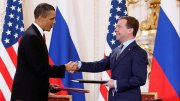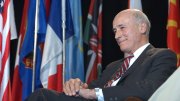
Photograph by Lillian Wei
Undergraduates from the inaugural Harvard China Student Internship Program, at the Shanghai Bund Center Office with staff members John Chen and Lillian Wei (front row, far right).
Harvard on July 1 opened the newest in an expanding network of international offices, in Shanghai, and is scheduled to launch another this autumn, in Beijing. The outpost is intended to support faculty and student research, interns, admissions, collaboration with local universities, and alumni relations. The official opening came three months after a pan-Asian Harvard Alumni Association conference in Shanghai, keynoted by President Drew Faust, a tangible sign of the University’s large and growing involvement in the People’s Republic and east Asia (see “Connecting with China,” May-June, page 67).
The office (www.fas.harvard.edu/~hcf/chinaoffice.html) was inaugurated in a joint visit by Harvard Business School (HBS) dean Jay O. Light and historian William C. Kirby, who is Chang professor of China studies, Spangler Family professor of business administration, director of the Fairbank Center for East Asian Research—the locus for much of the University’s research in the region—and chair of the Harvard China Fund, a sort of academic venture-capital fund (see “Venturing into China,” November-December 2007, page 77).
The multidisciplinary roles assumed by those two Harvard representatives are appropriate to the new office’s aims. With HBS colleagues, Kirby has been developing a series of case studies on the evolution of rising state-owned and private businesses in China (such as Wanxiang Group, now a multibillion-dollar global auto-parts supplier); the cases are used in a course he co-teaches, “Doing Business in China in the Early 21st Century.” The Harvard China Fund itself (www.fas.harvard.edu/~hcf) recently made a second round of grants to support research on subjects ranging from village development to childrearing to the use of medicines; all involve counterparts in China. Harvard participants come from the schools of design, education, medicine, and public health, plus the Faculty of Arts and Sciences. And Light noted that HBS would deploy a staff person affiliated with its Asia Pacific Research Center, in Hong Kong, in the Shanghai office.
Kirby characterized the new physical presences in China as merely “initial steps” toward further advancing Harvard’s ambitious research and teaching missions in the region.








